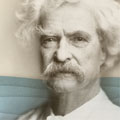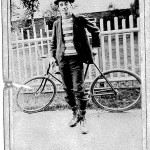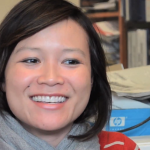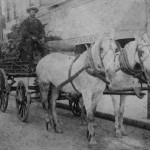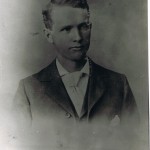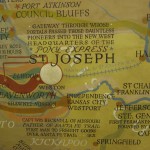I managed to resist much of Hannibal’s historic-site hucksterism—the souvenir Mark Twain t-shirts and the ride on the Too-Too Twain. But I succumbed to the Mark Twain Dinette’s 12-foot-tall rotating mug of root beer atop a 30-foot pole.
I lunched at the Dinette with Mary Lou Montgomery, editor of the five-day Hannibal Courier-Post, and followed her lead, ordering a homemade root beer (free refills) and a Dinette specialty, the Maid-Rite, “loose ground beef…cooked and seasoned to lock in that perfect flavor.”
As the editor for 26 years of a 6,000-7,000-circulation daily in Southbridge, MA, with a population of about 18,000, I had questions for Montgomery. She’s in a similar situation: also the editor of a 6,000-7,000-circulation daily in a town of about 18,000.
Newsroom staff diversity? Montgomery volunteers that diversity is nonexistent on the Courier-Post’s staff of 5 ¼. “We don’t get many minority applicants in Hannibal,” she says. “Like none.” She mentions a young new hire, Dominic Genetti: “He’s the closest thing. He’s Italian.”
What’s news to the Courier-Post? Montgomery says she strives for thorough coverage of everything Hannibal. “Now we’re virtually all local,” she says. She recalls her first job at the paper in November 1975 as a part-time proofreader: “When I was a pup, we would run people’s dead deer photos. We’re back doing them.”
Investigative journalism at the Courier-Post? Montgomery loves a good story, investigative or otherwise, but she talks about the Watergate generation of journalism graduates who “were going to change the world” in the past tense. “If traffic accidents are boring to you,” she says, “you are in the wrong business.”
After recently being named editor of the year by Suburban Newspapers of America, she explained her philosophy of focusing on “real people, rather than official sources.” For Groundhog Day, children are invited to submit photos of their pets. For a running “Young Artist of the Day” feature, children are asked to send in their drawings.
“My motto is ‘Look what we can accomplish together,’” she says. “It is not ‘my’ paper, but rather ‘our’ paper. We belong to our readers.”
In a town where black residents once had to rely on the weekly Home Protective Record and other black newspapers for local news, Montgomery goes out of her way to include black residents as part of her reader team.
She reports on a reunion of students from Douglass School, the area school attended by black students prior to school desegregation in the late 1950s:”The textbooks were hand-me-downs from the white schools in town; and the science lab was so limited that a teacher and one student would perform an experiment, and others would watch.”
Montgomery was named editor—the first female editor in the Courier-Post’s 173-year history—in May 2000. She says she first “tried being a man,” carrying a day planner instead of a purse.
But in 2000 she also began working toward a Hannibal-LaGrange College business degree, which she earned in 2004 at age 54. She says she learned along the way an important life lesson: “I can only be myself and that’s good enough.”
What will be good enough, however, to guarantee the survival of the Courier-Post and other newspapers? When the paper started—in the era when Samuel Clemens (Mark Twain) had a paper route and then worked as a printer’s devil for the Hannibal Gazette—“the newspaper age was dawning in America,” writes Ron Powers. Today that age may be dying.
Newspapers struggle to survive. They cut costs and seek new revenue sources.
“We charge for obits now,” Montgomery said. And the paper charges $10 for publishing a wedding photo, and an added fee if you want more than 150 words in your wedding story. Montgomery expects local businesses as well as the public to support the paper with advertising, not just to request news coverage.
Whatever newspapers’ future, Montgomery will remain devoted to them. She says, “I love newspapers. I love newspapers. I love newspapers.”
Loren Ghiglione

